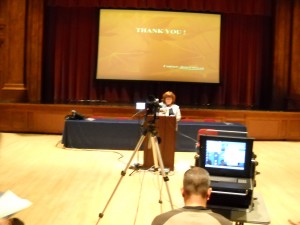The opening lecture for the 2010 Clifford Symposium was given by Dr. Susan L. Ray of the University of Western Ontario.
Ray discussed “exclusionary othering” and its affects on refugees during forced migrations. Exclusionary othering, says Ray, is when power is used within relationships for domination and subordination which in turn can leave the powerless marginalized and alienated. She then discussed “inclusionary othering,” which was an alternative method of working with refugees who have been forced to migrate. Inclusionary othering is power within relationships for transformation and coalition building; its consequences are all positive and consist of: sense of community and consciousness raising. Some strategies Ray suggested for using inclusionary othering were: role taking, reconceptualizing meaning & understanding, and connecting as allies. She ending her lecture with the idea that we must connect through knowing each others differences because “we are all different, we are all the same.” For her examples she talked about the Rwandan genocide and how two different individuals who were part of the peace effort were able to connect personally with Rwandan individuals which in turn was inclusionary othering rather than exclusionary.
Overall I found Ray’s lecture engaging. I was attentive the whole time because the ideas of exclusionary v. inclusionary othering were all new to me; but I just had trouble seeing the larger picture and how important it was. But, I do think it is important for people/countries to practice inclusionary othering rather than exclusionary othering. There was one really good question asked by a female Middlebury student (I forget her name) who asked how inclusionary othering would help the victims during their struggle–she said it wouldn’t give them food or help them if they were “dying on the side of the road.” I felt that Ray’s response was weak, and beat around the meat of the question, only reflecting on the specific of her Rwanda example she gave earlier.
Here is the really horrible picture I took:

Alex
